Alfa Romeo Junior vs Mercedes EQB – Which model is better for everyday use?
Two cars, one duel: Alfa Romeo Junior meets Mercedes EQB.
Which one wins in performance, efficiency and value for money? Find out now!
Costs and Efficiency:
Looking at overall running costs, both models reveal some interesting differences in everyday economy.
Alfa Romeo Junior has a decisively advantage in terms of price – it starts at 25700 £, while the Mercedes EQB costs 45900 £. That’s a price difference of around 20198 £.
In terms of energy consumption, the advantage goes to the Alfa Romeo Junior: with 15.10 kWh per 100 km, it’s barely noticeable more efficient than the Mercedes EQB with 15.20 kWh. That’s a difference of about 0.10 kWh.
As for range, the Mercedes EQB performs distinct better – achieving up to 535 km, about 125 km more than the Alfa Romeo Junior.
Engine and Performance:
Power, torque and acceleration say a lot about how a car feels on the road. This is where you see which model delivers more driving dynamics.
When it comes to engine power, the Mercedes EQB has a slight edge – offering 292 HP compared to 280 HP. That’s roughly 12 HP more horsepower.
In acceleration from 0 to 100 km/h, the Alfa Romeo Junior is minimal quicker – completing the sprint in 5.90 s, while the Mercedes EQB takes 6.20 s. That’s about 0.30 s faster.
In terms of top speed, the Alfa Romeo Junior performs distinct better – reaching 206 km/h, while the Mercedes EQB tops out at 160 km/h. The difference is around 46 km/h.
There’s also a difference in torque: Mercedes EQB pulls noticeable stronger with 520 Nm compared to 345 Nm. That’s about 175 Nm difference.
Space and Everyday Use:
Beyond pure performance, interior space and usability matter most in daily life. This is where you see which car is more practical and versatile.
Both vehicles offer seating for 5 people.
In curb weight, Alfa Romeo Junior is clearly lighter – 1380 kg compared to 2105 kg. The difference is around 725 kg.
In terms of boot space, the Mercedes EQB offers slightly more room – 495 L compared to 415 L. That’s a difference of about 80 L.
In maximum load capacity, the Mercedes EQB performs distinct better – up to 1710 L, which is about 430 L more than the Alfa Romeo Junior.
When it comes to payload, Mercedes EQB minimal takes the win – 435 kg compared to 420 kg. That’s a difference of about 15 kg.
Who wins the race?
The Alfa Romeo Junior proves to be slightly ahead and therefore becomes our DriveDuel Champion!
Alfa Romeo Junior is the better all-rounder in this comparison.
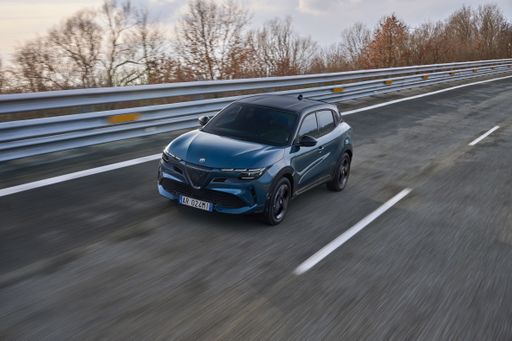 @ Alfa Romeo / Stellantis Media
@ Alfa Romeo / Stellantis Media
Alfa Romeo Junior
Alfa Romeo Junior
The Alfa Romeo Junior captures the essence of Italian design with its sleek lines and compact dimensions, making it an icon of elegance and performance. With a spirited driving experience and a charming retro aesthetic, it appeals to enthusiasts and casual drivers alike. This delightful car embodies the brand's rich heritage while remaining a fun and engaging option for those seeking a unique automotive experience.
details @ Alfa Romeo / Stellantis Media
@ Alfa Romeo / Stellantis Media
 @ Alfa Romeo / Stellantis Media
@ Alfa Romeo / Stellantis Media
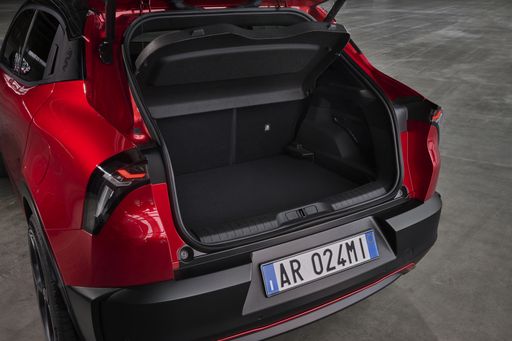 @ Alfa Romeo / Stellantis Media
@ Alfa Romeo / Stellantis Media
Mercedes EQB
The Mercedes-Benz EQB is an all-electric compact SUV that seamlessly blends practicality with modern luxury. Its sleek design and spacious interior make it an attractive option for families seeking both style and function. With advanced technology and impressive range capabilities, the EQB is a testament to Mercedes-Benz's commitment to sustainable mobility.
details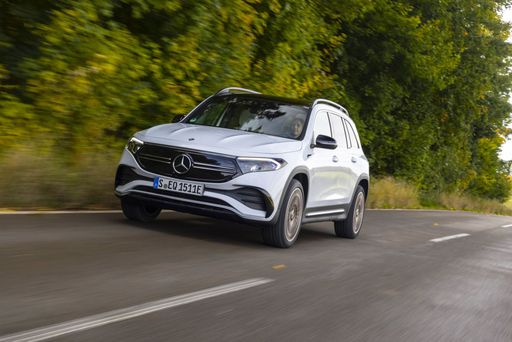 @ Mercedes-Benz Group Media
@ Mercedes-Benz Group Media
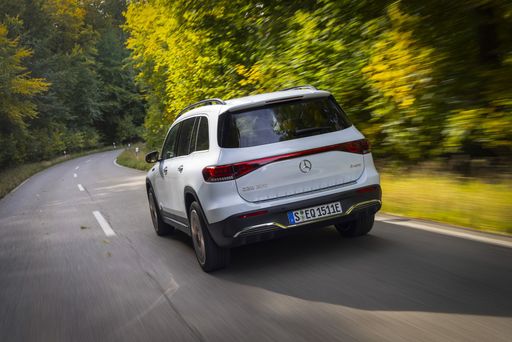 @ Mercedes-Benz Group Media
@ Mercedes-Benz Group Media
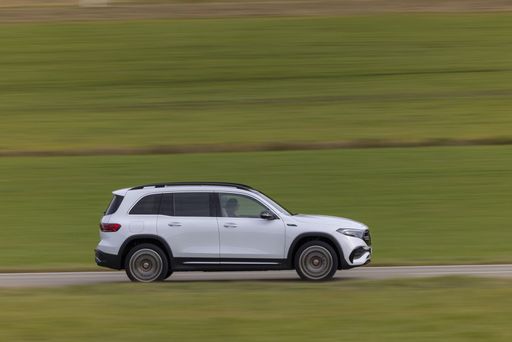 @ Mercedes-Benz Group Media
@ Mercedes-Benz Group Media
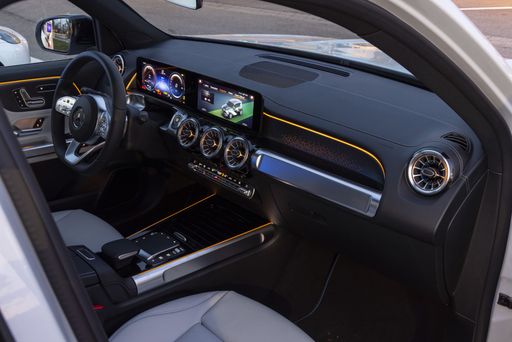 @ Mercedes-Benz Group Media
@ Mercedes-Benz Group Media
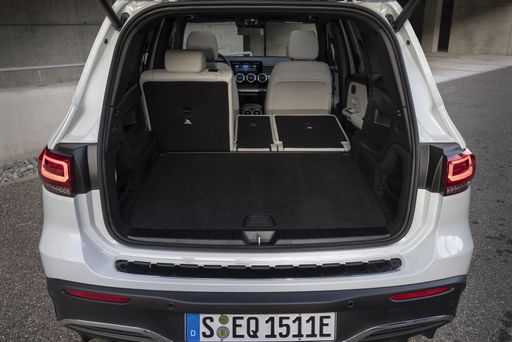 @ Mercedes-Benz Group Media
@ Mercedes-Benz Group Media
 @ Alfa Romeo / Stellantis Media
@ Alfa Romeo / Stellantis Media
|
 @ Mercedes-Benz Group Media
@ Mercedes-Benz Group Media
|
|
|
|
Costs and Consumption |
|
|---|---|
|
Price
25700 - 41600 £
|
Price
45900 - 58900 £
|
|
Consumption L/100km
4.8 - 5.4 L
|
Consumption L/100km
-
|
|
Consumption kWh/100km
15.1 - 17.5 kWh
|
Consumption kWh/100km
15.2 - 17.2 kWh
|
|
Electric Range
344 - 410 km
|
Electric Range
468 - 535 km
|
|
Battery Capacity
0.4 - 51 kWh
|
Battery Capacity
70.50 kWh
|
|
co2
0 - 119 g/km
|
co2
0 g/km
|
|
Fuel tank capacity
44 - 45 L
|
Fuel tank capacity
-
|
Dimensions and Body |
|
|---|---|
|
Body Type
SUV
|
Body Type
SUV
|
|
Seats
5
|
Seats
5
|
|
Doors
5
|
Doors
5
|
|
Curb weight
1380 - 1689 kg
|
Curb weight
2105 - 2170 kg
|
|
Trunk capacity
340 - 415 L
|
Trunk capacity
495 L
|
|
Length
4173 mm
|
Length
4684 mm
|
|
Width
1781 mm
|
Width
1834 mm
|
|
Height
1505 - 1538 mm
|
Height
1654 - 1689 mm
|
|
Max trunk capacity
1205 - 1280 L
|
Max trunk capacity
1710 L
|
|
Payload
390 - 420 kg
|
Payload
435 kg
|
Engine and Performance |
|
|---|---|
|
Engine Type
Electric, Petrol MHEV
|
Engine Type
Electric
|
|
Transmission
Automatic
|
Transmission
Automatic
|
|
Transmission Detail
Dual-Clutch Automatic, Reduction Gearbox
|
Transmission Detail
Reduction Gearbox
|
|
Drive Type
Front-Wheel Drive, All-Wheel Drive
|
Drive Type
Front-Wheel Drive, All-Wheel Drive
|
|
Power HP
136 - 280 HP
|
Power HP
190 - 292 HP
|
|
Acceleration 0-100km/h
5.9 - 9.1 s
|
Acceleration 0-100km/h
6.2 - 8.9 s
|
|
Max Speed
150 - 206 km/h
|
Max Speed
160 km/h
|
|
Torque
230 - 345 Nm
|
Torque
385 - 520 Nm
|
|
Number of Cylinders
3
|
Number of Cylinders
-
|
|
Power kW
100 - 207 kW
|
Power kW
140 - 215 kW
|
|
Engine capacity
1199 cm3
|
Engine capacity
-
|
General |
|
|---|---|
|
Model Year
2024 - 2025
|
Model Year
2024 - 2025
|
|
CO2 Efficiency Class
A, C, D
|
CO2 Efficiency Class
A
|
|
Brand
Alfa Romeo
|
Brand
Mercedes-Benz
|
What drive types are available for the Alfa Romeo Junior?
Available configurations include Front-Wheel Drive or All-Wheel Drive.
The prices and data displayed are estimates based on German list prices and may vary by country. This information is not legally binding.
